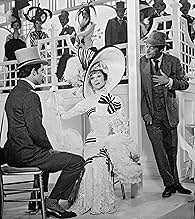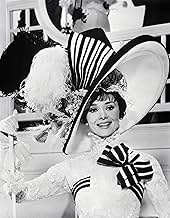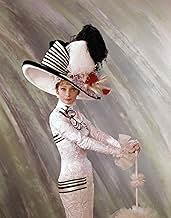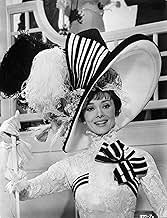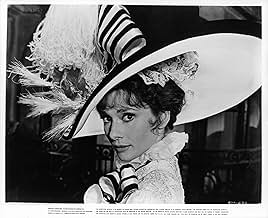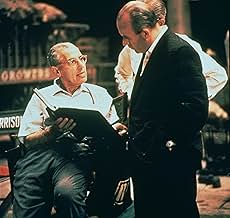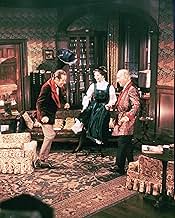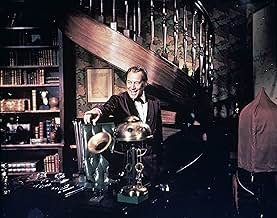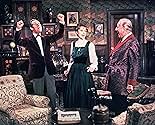My Fair Lady
- 1964
- Tous publics
- 2h 50min
Un professeur de phonétique misogyne et snob accepte le pari de transformer une vendeuse de fleurs et la rendre présentable dans la haute société.Un professeur de phonétique misogyne et snob accepte le pari de transformer une vendeuse de fleurs et la rendre présentable dans la haute société.Un professeur de phonétique misogyne et snob accepte le pari de transformer une vendeuse de fleurs et la rendre présentable dans la haute société.
- Réalisation
- Scénario
- Casting principal
- Récompensé par 8 Oscars
- 26 victoires et 13 nominations au total
David Ahdar
- Ball Guest
- (non crédité)
- …
Elizabeth Aimers
- Cockney
- (non crédité)
Helen Albrecht
- Ascot Extra
- (non crédité)
John Alderson
- Jamie - Doolittle's crony
- (non crédité)
Mary Alexander
- Cockney
- (non crédité)
Gertrude Astor
- Cockney
- (non crédité)
LaWana Backer
- Ad Lib at Church
- (non crédité)
Walter Bacon
- Ball Guest
- (non crédité)
Avis à la une
8dxia
During the first two hours of this movie, I had thought that it was the greatest musical ever brought to film. It's only during the last hour that it begins to languish and plod. If the first two hours are a solid 10/10, then the last hour is about a 4/10. It brings the average to about 8/10, which is exactly what I gave the movie, but it's fun to think about how great the movie could have been had the producers decided to find a better ending to an otherwise superb story.
It goes to show that film is a tricky medium, and regardless of how great musicals can be, live action simply isn't as interesting when it's recorded. 'My Fair Lady' could have used a bit of trimming, especially in Stanley Holloway's pieces, WITH A BIT OF LUCK and GET ME TO THE CHURCH ON TIME. Although they may have been spectacular to see on stage, movie audiences will yearn to see more about Eliza and wonder why the director spends so much time on her father.
On the brighter side, I believe that I have never seen Audrey Hepburn in a more perfect role. Eliza Doolittle is a lot like she, in their rise from poverty. And watching Audrey is like being invited to see a person shine in their most perfect niche. She isn't gorgeous in a modern sense, but even a decade after her death, her image still carries that immortal appeal. Some critics call it the "it" factor. We don't know what "it" is but we know it's there.
Billy Wilder once said, "God kissed her face, and there she was." For me, I just like her smile, and my smile when I watch her exuberance in one of the defining roles in her career.
It goes to show that film is a tricky medium, and regardless of how great musicals can be, live action simply isn't as interesting when it's recorded. 'My Fair Lady' could have used a bit of trimming, especially in Stanley Holloway's pieces, WITH A BIT OF LUCK and GET ME TO THE CHURCH ON TIME. Although they may have been spectacular to see on stage, movie audiences will yearn to see more about Eliza and wonder why the director spends so much time on her father.
On the brighter side, I believe that I have never seen Audrey Hepburn in a more perfect role. Eliza Doolittle is a lot like she, in their rise from poverty. And watching Audrey is like being invited to see a person shine in their most perfect niche. She isn't gorgeous in a modern sense, but even a decade after her death, her image still carries that immortal appeal. Some critics call it the "it" factor. We don't know what "it" is but we know it's there.
Billy Wilder once said, "God kissed her face, and there she was." For me, I just like her smile, and my smile when I watch her exuberance in one of the defining roles in her career.
10Hitchcoc
I don't know how much I can add to this. The musical stands alone, as far as I'm concerned, so it puts a lot of pressure on the director, George Cukor, one of the greatest, to complement it. This is a lot to ask. I love this movie. I never got a chance to see the Broadway cast (I was four when it opened), but I have never been disappointed. The production numbers are grand, the byplay between the smug, offensive Higgins and Eliza is precious (my favorite song is "Just You Wait, Henry Higgins"). I've always been intrigued how Freddy never even has a chance (I can't watch those wonderful Sherlock Holmes episodes without imagining the grim visage of Jeremy Brett singing "On the Street Where You Live."). The one thing that made an impression on me, though some may see it as a criticism, is how "clean" everything is. There is no doubt in my mind that Cukor was elevating not only the dialogue but the visual images. It's probably not fair to like a movie because you like looking at an actress, but Audrey Hepburn glows in her Eliza, and I don't care if she is or was a street girl, she is the magical rose on the landscape before she ever meets Higgins. The business about who sings the songs is of no significance to me. This is a movie, not the Broadway show, so the images and sounds are melded and presented. Knowing that Audrey Hepburn has a beautiful voice makes it moot as well. I don't know if she could carry the picture or not--maybe not, but it doesn't concern me. When I first saw Stanley Holloway, there was something about him that grated on me (too many performances on the Ed Sullivan Show). He grated on me as Eliza's father. Now, every time I see this film, I thoroughly enjoy him and I really like the comedic qualities of his song. I love how he and his cronies cavort around London with total disregard for their base roots. I could go on, but I really like this film because it is filled with class: George Bernard Shaw filtered through George Cukor. Not bad!
I have read in a great many places (including the IMDb) that Henry Higgins is a misogynist. It has also been said that the film is a misogynist's fairy tale. Anyone saying this has clearly not watched this film too closely.
First, Higgins is not a misogynist. A misogynist hates women. What Higgins is, in reality, is a misanthrope. A misanthrope basically dislikes and distrusts everyone! Watch the film and you'll notice that Higgins treats everyone with the same disregard-Col. Pickering, Eliza's father, his own mother-everyone receives his rather cynical disdain. Some of the minor characters come off being treated worse than the principals do. It's simply more noticeable with Eliza because it's more frequent, it's newer with Eliza because the other principal characters have known Higgins longer and thus take it in stride. The myth that Higgins is a misogynist is perpetuated by the song, "Why Can't A Woman Be More Like a Man?".
Second, it can hardly be called a misogynist's fairy tale. If that were the case, I doubt Alfred Doolittle would have cause to sing, "Get Me To the Church On Time", as he'd hardly be getting married. His life is just as "ruined" as Eliza's by his encounters with Higgins, just as altered as her life has been.
This is a great musical, a good movie and it was even better as the original play by Shaw. Well worth seeing. Recommended.
First, Higgins is not a misogynist. A misogynist hates women. What Higgins is, in reality, is a misanthrope. A misanthrope basically dislikes and distrusts everyone! Watch the film and you'll notice that Higgins treats everyone with the same disregard-Col. Pickering, Eliza's father, his own mother-everyone receives his rather cynical disdain. Some of the minor characters come off being treated worse than the principals do. It's simply more noticeable with Eliza because it's more frequent, it's newer with Eliza because the other principal characters have known Higgins longer and thus take it in stride. The myth that Higgins is a misogynist is perpetuated by the song, "Why Can't A Woman Be More Like a Man?".
Second, it can hardly be called a misogynist's fairy tale. If that were the case, I doubt Alfred Doolittle would have cause to sing, "Get Me To the Church On Time", as he'd hardly be getting married. His life is just as "ruined" as Eliza's by his encounters with Higgins, just as altered as her life has been.
This is a great musical, a good movie and it was even better as the original play by Shaw. Well worth seeing. Recommended.
... that being the late 50s to the late 60s. They don't particularly age well .Looking back on them in the context of the 1960s they seem downright anachronistic. . At least this film is not offensive. Gigi, which won Best Picture of 1958, has a young woman's relatives trying to turn her into a prostitute, from which she wisely figures out there is no coming back, while Maurice Chevalier musically ogles little girls from the shelter of the bushes. That one didn't age well in a bunch of ways.
This one has fabulous music, magnificent art design, quite a bit of great dry humor, and perfect casting - except I really wish James Cagney had taken the part of Eliza's father. It would have made a great bookend for his film career. The direction is perfectly on target for late career George Cukor. He won Best Director Oscar for this and didn't make another film for five years.
Rex Harrison certainly deserved his Best Actor Oscar as misanthropic phoneticist Henry Higgins. He is both stern and humorous, his vocals in both song and word are alive and nothing less than perfect. Also, Wilfrid Hyde-White as Pickering adds a great deal to the film, and I appreciate him more on successive viewings.
Thus it is hard to give a film with such great production values less than a 7/10. I have a couple of problems with it. First, it is just too long. Clocking in at two hours and fifty minutes, there is just too much movie for too little story. Pygmalian, starring Leslie Howard, was perfect at ninety minutes, and I actually prefer that film to this one. Second, I don't like the resolution because there isn't one. After all of that squabbling at Higgins' mother's house, after Higgins realizing he has "grown accustomed to her face", the end is just a let down. Had it gone on any longer it would have become Season Four of Moonlighting.
This one has fabulous music, magnificent art design, quite a bit of great dry humor, and perfect casting - except I really wish James Cagney had taken the part of Eliza's father. It would have made a great bookend for his film career. The direction is perfectly on target for late career George Cukor. He won Best Director Oscar for this and didn't make another film for five years.
Rex Harrison certainly deserved his Best Actor Oscar as misanthropic phoneticist Henry Higgins. He is both stern and humorous, his vocals in both song and word are alive and nothing less than perfect. Also, Wilfrid Hyde-White as Pickering adds a great deal to the film, and I appreciate him more on successive viewings.
Thus it is hard to give a film with such great production values less than a 7/10. I have a couple of problems with it. First, it is just too long. Clocking in at two hours and fifty minutes, there is just too much movie for too little story. Pygmalian, starring Leslie Howard, was perfect at ninety minutes, and I actually prefer that film to this one. Second, I don't like the resolution because there isn't one. After all of that squabbling at Higgins' mother's house, after Higgins realizing he has "grown accustomed to her face", the end is just a let down. Had it gone on any longer it would have become Season Four of Moonlighting.
Marni Nixon's singing in both THE KING AND I and WEST SIDE STORY sounded purer to me than did her work in MY FAIR LADY; I thought this was fine, but somewhat thinner and less rich (the voice may well have thinned a little by then). It's lovely to hear Hepburn in "Just You Wait," as it comes as something of a surprise if you had thought all of her singing was dubbed, as I once had. The dubbing and acting do seem to come to a perfect luminous moment at least once: at the end of "I Could Have Danced All Night" it seems as if Audrey Hepburn is really singing it and gives the impression that possibly no one else ever had. It is possible that the best result might have been to let some of the other simpler songs, like "Wouldn't It Be Loverly" be done by Hepburn, and leave those obviously requiring a more technically accomplished singer to Nixon.
It is interesting that Hepburn's "Moon River" is not included on the old soundtrack of BREAKFAST AT TIFFANY'S. Similarly, I went to her memorial service at the 5th Avenue Presbyterian Church here in New York in 1993, and, uncannily, the entire program was listed EXCEPT that... all of a sudden they played her "Moon River" and the whole church became very emotionally charged. I think we were grateful that this let us experience our grief directly by forcing something immediate (but not cruel) on us like that.
I have always been glad anyway that Hepburn did the part and it is certainly the only real reason the film still has life--the controversy about her getting the part may have as much to do with that "life" as anything: it would be a mere artifact, a duplicate of the stage production had Julie Andrews been chosen. Andrews still seems primarily a stage star despite all the movies she made. Most of them are mediocre,a few of them quite good even if I haven't found them interesting myself: she is perfect in THE SOUND OF MUSIC, but the phenomenal appeal of this film is based on something considerably less sharp than what made the earlier Rodgers and Hammerstein masterpieces great-- even when they weren't quite as lavishly produced. Clearly, for example, the score of SOUTH PACIFIC is light-years beyond that of THE SOUND OF MUSIC. Admittedly, Andrews's singing of the score is better than Mary Martin's was. And the voice you can still hear on the Broadway and London cast recordings of MY FAIR LADY is far more complex and rare than Nixon's is.
Still, she wouldn't have made the film unique: while it may or may not be a great film, it has managed to retain a one-of-a-kind quality, and is kept from being a mere facsimile.
It is certainly true that Ms. Nixon should have been credited for her work, whatever our other reservations are. I nevertheless think that some of the lighter opera voices of the time--maybe Anna Moffo or Mirella Freni--would have been better (I don't think Ms. Nixon was "too fine," but rather not quite as good here as she once had been.) Dubbing doesn't have to "match" all that perfectly; of course, certain examples--like Giorgio Tozzi for Rossano Brazzi as Emile de Becque do seem perfect. And if the case of MEETING VENUS is somewhat different, no one ever would dream of worrying about Kiri TeKanawa's voice not matching Glenn Close (Ms.Close unfortunately let us hear her real one doing Wagner on Entertainment Tonight when plugging the film--a harsh and strident moment...)
This is one of quite a number of cases in which the original star was controversially replaced. The strangest may be the rejection of Ethel Merman for GYPSY, although Rosalind Russell was excellent. The smartest may have been Barbra Streisand for Carol Channing for HELLO, DOLLY! She was high-voltage enough for the gargantuan production and her trumpet-like singing was magnificent--a number of us think this is her best film--and it ages fantastically. And, while it is not a matter of replacing a role originated by someone else, Hepburn herself was loudly denounced for BREAKFAST AT TIFFANY'S by Truman Capote; we think of the role as her indelible mark (and surely it is in some ways), but his preference for Marilyn Monroe could have unquestionably led to something extraordinary also--and maybe that idiotic ending that is so hard to overlook would have been replaced by the much more subtle and meaningful one Capote wrote.
It really is Audrey Hepburn who makes MY FAIR LADY continue to "do its work." And in it we may have well seen the most gloriously ripe moment of her incredible beauty.
It is interesting that Hepburn's "Moon River" is not included on the old soundtrack of BREAKFAST AT TIFFANY'S. Similarly, I went to her memorial service at the 5th Avenue Presbyterian Church here in New York in 1993, and, uncannily, the entire program was listed EXCEPT that... all of a sudden they played her "Moon River" and the whole church became very emotionally charged. I think we were grateful that this let us experience our grief directly by forcing something immediate (but not cruel) on us like that.
I have always been glad anyway that Hepburn did the part and it is certainly the only real reason the film still has life--the controversy about her getting the part may have as much to do with that "life" as anything: it would be a mere artifact, a duplicate of the stage production had Julie Andrews been chosen. Andrews still seems primarily a stage star despite all the movies she made. Most of them are mediocre,a few of them quite good even if I haven't found them interesting myself: she is perfect in THE SOUND OF MUSIC, but the phenomenal appeal of this film is based on something considerably less sharp than what made the earlier Rodgers and Hammerstein masterpieces great-- even when they weren't quite as lavishly produced. Clearly, for example, the score of SOUTH PACIFIC is light-years beyond that of THE SOUND OF MUSIC. Admittedly, Andrews's singing of the score is better than Mary Martin's was. And the voice you can still hear on the Broadway and London cast recordings of MY FAIR LADY is far more complex and rare than Nixon's is.
Still, she wouldn't have made the film unique: while it may or may not be a great film, it has managed to retain a one-of-a-kind quality, and is kept from being a mere facsimile.
It is certainly true that Ms. Nixon should have been credited for her work, whatever our other reservations are. I nevertheless think that some of the lighter opera voices of the time--maybe Anna Moffo or Mirella Freni--would have been better (I don't think Ms. Nixon was "too fine," but rather not quite as good here as she once had been.) Dubbing doesn't have to "match" all that perfectly; of course, certain examples--like Giorgio Tozzi for Rossano Brazzi as Emile de Becque do seem perfect. And if the case of MEETING VENUS is somewhat different, no one ever would dream of worrying about Kiri TeKanawa's voice not matching Glenn Close (Ms.Close unfortunately let us hear her real one doing Wagner on Entertainment Tonight when plugging the film--a harsh and strident moment...)
This is one of quite a number of cases in which the original star was controversially replaced. The strangest may be the rejection of Ethel Merman for GYPSY, although Rosalind Russell was excellent. The smartest may have been Barbra Streisand for Carol Channing for HELLO, DOLLY! She was high-voltage enough for the gargantuan production and her trumpet-like singing was magnificent--a number of us think this is her best film--and it ages fantastically. And, while it is not a matter of replacing a role originated by someone else, Hepburn herself was loudly denounced for BREAKFAST AT TIFFANY'S by Truman Capote; we think of the role as her indelible mark (and surely it is in some ways), but his preference for Marilyn Monroe could have unquestionably led to something extraordinary also--and maybe that idiotic ending that is so hard to overlook would have been replaced by the much more subtle and meaningful one Capote wrote.
It really is Audrey Hepburn who makes MY FAIR LADY continue to "do its work." And in it we may have well seen the most gloriously ripe moment of her incredible beauty.
Oscars Best Picture Winners, Ranked
Oscars Best Picture Winners, Ranked
See the complete list of Oscars Best Picture winners, ranked by IMDb ratings.
Le saviez-vous
- AnecdotesCostume designer Cecil Beaton created 1,500 costumes for this movie, with the exception of the pearl white gown Hepburn wears to the Embassy Ball, an original Edwardian specimen Beaton found in an antique shop.
- GaffesWhen Prof. Higgins sings "An Ordinary Man" he turns on several phonographs, seconds later he turns off one of them but all of the sounds stop.
- Citations
Professor Henry Higgins: There even are places where English completely disappears; in America they haven't used it for years.
- Crédits fousIn the posters, playbills and the original cast album for the stage version of "My Fair Lady", the credits always read "based on Bernard Shaw's 'Pygmalion' ", letting the audience know what play "My Fair Lady" was actually adapted from. The movie credits simply read "from a play by Bernard Shaw".
- Versions alternativesIn the remastered version of the film, some of the scene changes are changed from sudden cuts to wipe outs, as they probably were when the film was released. When CBS Fox released it on video originally, they were changed to sudden cuts.
- ConnexionsFeatured in Toast of the Town: Épisode #18.17 (1965)
- Bandes originalesWhy Can't the English?
(1956) (uncredited)
Music by Frederick Loewe
Lyrics by Alan Jay Lerner
Performed by Rex Harrison, Wilfrid Hyde-White, and Audrey Hepburn
Meilleurs choix
Connectez-vous pour évaluer et suivre la liste de favoris afin de recevoir des recommandations personnalisées
Détails
- Date de sortie
- Pays d’origine
- Site officiel
- Langue
- Aussi connu sous le nom de
- Mi bella dama
- Lieux de tournage
- Stage 16, Warner Brothers Burbank Studios - 4000 Warner Boulevard, Burbank, Californie, États-Unis(Ascot & Ballroom scenes)
- Société de production
- Voir plus de crédits d'entreprise sur IMDbPro
Box-office
- Budget
- 17 000 000 $US (estimé)
- Montant brut aux États-Unis et au Canada
- 72 560 711 $US
- Week-end de sortie aux États-Unis et au Canada
- 354 764 $US
- 17 févr. 2019
- Montant brut mondial
- 72 685 970 $US
- Durée
- 2h 50min(170 min)
- Couleur
- Mixage
- Rapport de forme
- 2.20 : 1
Contribuer à cette page
Suggérer une modification ou ajouter du contenu manquant







